.
The School of Athens, Who is Who?
Philosophy. A routine of many roads leading from nowhere to nothing. Ambrose Bierce. The Devil's Dictionary.
Everything of importance has been said before by somebody who did not discover it. A. N. Whitehead
Greek Philosophy is very rich. A very popular quote is that all modern Philosophy are footnotes to the work of Plato, but this is not correct. The truth is that Plato and Aristotle influenced Philosophy and even Christian religion more than some may think. Jesus probably could speak Greek and Paul was influenced by Plato's philosophy. In Raphael's School of Athens many Greek philosophers and scientists are shown. I tried to find out of who is who in this piece of Art.
For the Eleatics changes are not real.
Eleatics | Parmenides of Elea | Melissus | Zenon von Elea
| Anaxagoras | Empedocles
Can everything change? At least you need some fixed reference point for the observation of the changes.
Ionian Philosopy:
| Anaximander | Anaximenes
Diogenes Apolloniates (or Diogenes of Apollonia)
Atomists: Democritus | Leucippus
Pythagoreans: Alcmaion of Crotona | Pythagoras | Theano | Archytas | Hippasus | Philolaus
Sophists: Antiphon | Gorgias | Hippias of Elis | Critias | Prodicus | Protagoras
The river is not the same..it changes continously
![]()
(...fire when it comes will judge and condemn all things). Heraclitus (c. 544 BC – c. 483 BC)
|
According to Douglas Adams there is a theory which states that if ever anybody discovers exactly what the Universe is for and why it is here, it will instantly disappear and be replaced by something even more bizarre and inexplicable. There is another theory which states that this has already happened! According to the Greek Stoics the world will be destroyed by a fire (ekpyrosis) and replaced / restored) (apokatastasis) again by god with an identical Universe. |
'That which is so great that there is nothing outside it may be called the Great One; and that which is so small that there is nothing inside it maybe called the Small One.' 'What has no thickness and will not admit of being repeated is 1000 lî in size.' 'Heaven may be as low as the earth.' 'A mountain may be as level as a marsh.' ' The sun in the meridian may be the sun declining.' 'A creature may be born to life and may die at the same time.' '(When it is said that) things greatly alike are different from things a little alike, this is what is called making little of agreements and differences; (when it is said that) all things are entirely alike or entirely different, this is what is called making much of agreements and differences.' 'The south is unlimited and yet has a limit.' Zhuangzi Chuang Chou about the sayings of Hui Shih (4th century BC) ; Zhuangzi who dreamed that he was a butterfly and after he woke up, he wondered whether he was Zhuangzi who had just finished dreaming he was a butterfly, or a butterfly who had just started dreaming he was Zhuangzi.

But the truth men of Athens is this: that real wisdom is the property of God, and this oracle (Delphi) is his way of telling us that human wisdom has little or no value. It seems to me that he is not referring literally to Socrates, but has merely taken my name as an example, as he would say to us ‘The wisest of you men is he who has realized, like Socrates, that in respect of wisdom he is really worthless. Socrates according to Plato
Socrates is accused by Lycon and Anytus via Meletus that he corrupts the youth. Not thar only the followers of Socrates tried to overthrow the Athenian Democracy but also the sons of Lycon (Autolycus) and Anytus had a sexual relationship with the old bisexual Socrates. Is it a surprise that the former general and politician Anytus does not like Socrates? Athens just lost all its power after the Peloponessian war. Another reason to offer Socrates as a sacrifice to the angry Gods. With 280 from 500 voices the result of the trial is: Socrates is guilty and he must die.
No one can read the story of the death of Socrates in the prison, as told by Plato in the "Phaido," without feeling (aside from the noble philosophical setting) how much more humane were such executions by hemlock than is the modern gallows or electric chair. William Stearns Davis
<Socrates , Socrates: Theosophical , I.F. Stone Breaks the Socrates Story , The Trial of Socrates , The Last Days of Socrates ,
Did Plato tell the truth? The death of Socrates using only "conium maculatum" some physicians say would be much worse and painfull than Plato describes. Hemlock Poisoning and the Death of Socrates: Did Plato Tell the Truth?
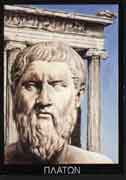 |
| Part of the series on: The Dialogues of Plato |
| Early dialogues: |
| Apology – Charmides – Crito |
| Euthyphro – First Alcibiades |
| Hippias Major – Hippias Minor |
| Ion – Laches – Lysis |
| Transitional & middle dialogues: |
| Cratylus – Euthydemus – Gorgias |
| Menexenus – Meno – Phaedo |
| Protagoras – Symposium |
| Later middle dialogues: |
| The Republic – Phaedrus |
| Parmenides – Theaetetus |
| Late dialogues: |
| Timaeus – Critias |
| The Sophist – The Statesman |
| Philebus – Laws |
| Of doubtful authenticity: |
| Clitophon – Epinomis |
| Epistles – Hipparchus |
| Minos – Rival Lovers |
| Second Alcibiades – Theages |
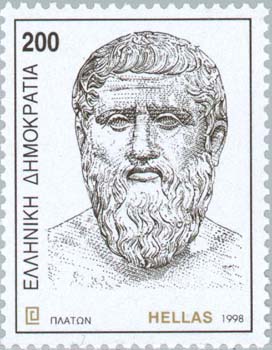
Plato , Plato's Life by Diogenes Laertios
Texts
- Apology
- Charmides
- Critias
- Timaeus , Comments
- Symposium , Plato's Symposium, a discussion about Love (Comments)
- Protagoras , Comments
- Cratylus
- Euthydemus
- Euthyphro
- Ion
- Laches
- Menexenus
- Meno
- Parmenides
- Phaedo
- Phaedrus
- Philebus
- Sophist
- Statesman
- Theaetetus
Plato's intellectual light , Plato: Paradise and Hell, what happens after our death? ,

Where is Plato's Republic? Next to Yongy-Bongy-Bo, Shangri-La and Nirvana Land according to an American Newspaper Map
Speusippus - Xenocrates of Calchedon - Polemon of Athens - Pamphilus of Samos
Arcesilaus of Pitane - Lacydes of Cyrene - Euandros of Phocis - Hegesinus of Pergamon
Carneades of Cyrene - Hagnon of Tarsus - Charmadas - Melanthius of Rhodes -
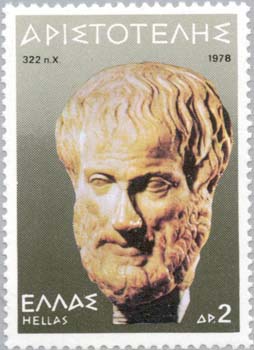
The man was born, he worked, and then died. Martin Heidegger, German philosopher, A short biography of Aristotle presented in a lecture.

The stoic world: A deterministic world (where everything, good or bad ,is predeterminded). A world not separated from god, as part of the world all with a the gift of logos (that as a seed of reason was called "logos spermatikos") are part of a "cosmopolis". It is this participation that provides at least some answer to the problem of determinism. The idea of a cosmopolis was probably a reason that stoicism was supported by the Roman philosophers and rulers for which Rome was the cosmopolis.
Cleanthes (Hymn to Zeus) - Chrysippus - Panaetius - Posidonius
Epictetus ( Encheiridion, The Discourses )
The Golden Sayings of Epictetus
Who was the best Greek Philosopher: Plato, Socrates, Epicurus, Zeno? Forget all these! I say it was
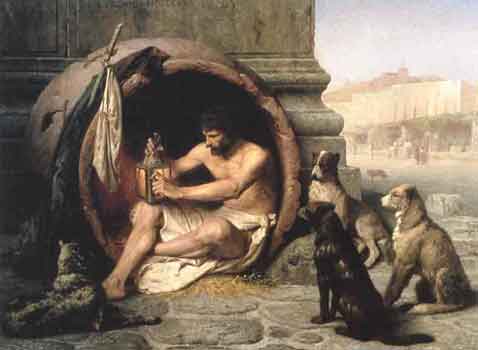
Diogenes of Sinope "The dog" !
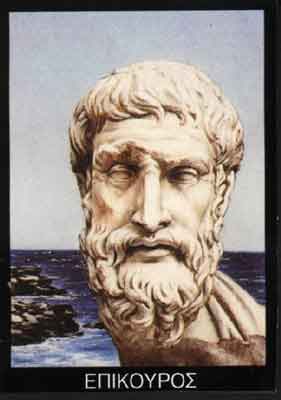
Diogenes of Oenoanda from the 2nd AD (text related to Epicurus)
Cyrenaics
Aristippus - Arete of Cyrene -
Scepticism
|
PYRRHONISM, n. An ancient philosophy, named for its inventor. It consisted of an absolute disbelief in everything but Pyrrhonism. Its modern professors have added that. Ambrose Bierce, THE DEVIL'S DICTIONARY A different custom prevails with the Eclectics and Pyrrhonians who, while asserting that nothing can be known, keep on asking and searching without ever wanting to find anything. Giordano Bruno |
Pyrrho, Pyrrhonism and Academic Scepticism , Pyrrhonism and Maadhyamika
I proclaim that justice is nothing else than the interest of the stronger Thrasymachus
Hellenistic Ethics and Philosophical Power
Neoplatonic philosophers
Plotinus, (c. 205-–270 AD) , founder of Neoplatonism : Complete Works, Vol1, Vol2 , Vol3, Vol4,
Porphyry (c. 232 AD - c. 304/9), Neoplatonist, student of Plotinus.
Iamblichus (242/5 - 327 AD), .
Proclus (Lycaeus) (February 8, 412 – April 17, 487)
Diogenes Laertius, biographies (with many interesting stories) of ancient philosophers
Paradoxa
When the Argo ship was repaired after its voyage and destroyed parts were replaced by new material Greek Philosophers asked whether this was still the ship Argo. Zeno asked surprisingly whether motion is just an illusion and Parmenides said that all Cretans are liars. They did so to show logical problems with infinite small and infinite large quantities that in the last two centuries again were considered by mathematician after more than 2000 years.
Why Achilles or anybody else can never catch a Tortoise? The paradox of motion and nothing changes
The Quantum Zeno and Anti Zeno Paradox or Heraclitus Effect (Powerpoint presentation) , Meno’s Paradox
The death of a good man is nothing to be sad about, since it puts him beyond the power of fortune and secures his happiness for eternity. Plutarch, Pelopidas
Is death necessary and can death actually harm us? , Are all Cretans liars as Epimenides the Exorcist says? It depends how many say this!
To be or not to be, A multidimensional logic approach

The Muse Calliope anticlockwise surrounded by Socrates and the Seven Sages of Greece - Solon, , Thales, Bias , Cleobulos, Periandros, Pittacus and Chilon. . Mosaic late 3rd century AD.
Periander | Solon | Aristeas of Proconessus | Pherecydes of Syros | Chilon of Sparta | Bias of Priene | Cleobulus of Rhodes | Anacharsis | Pittacus of Mitylene | Apollodorus of Phaleron | Archelaus of Athens , | Archesilaus of Pitane | Ariston of Chios | Aristoxenus of Tarentum
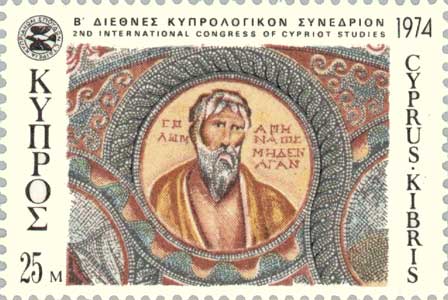
Solon, Miden Agan, "Nothing in excess"
A competition between Greek philosophers: Who is the best? , The unfortunate Sisyphus and Albert Camus
The Problem of Happiness in the Ancient World (Is Happiness possible ?)
All I know is that I know nothing, Socrates, for Metrodorus a very arrogant statement:
We know nothing, not even whether we know or do not know, or what it is to know or not to know, or in general whether anything exists or not, Metrodorus of Chios (Metrodorus how do you know this?)
The Origin of Europe with the Greek Discovery of the World (PDF)
Stanford Encyclopedia of Philosophy (a free available work of more than 950 professional philosophers, that you can support!)
Don't be prideful with any excellence that is not your own. If a horse should be prideful and say, " I am handsome," it would be supportable. But when you are prideful, and say, " I have a handsome horse," know that you are proud of what is, in fact, only the good of the horse. What, then, is your own? Only your reaction to the appearances of things. Thus, when you behave conformably to nature in reaction to how things appear, you will be proud with reason; for you will take pride in some good of your own. Epictetus
Ancient Greek Philosophy Links
| Ancient Greece
Science, Technology , Medicine , Warfare, , Biographies , Life , Cities/Places/Maps , Arts , Literature , Philosophy ,Olympics, Mythology , History , Images Medieval Greece / Byzantine Empire Science, Technology, Arts, , Warfare , Literature, Biographies, Icons, History Modern Greece Cities, Islands, Regions, Fauna/Flora ,Biographies , History , Warfare, Science/Technology, Literature, Music , Arts , Film/Actors , Sport , Fashion --- |

